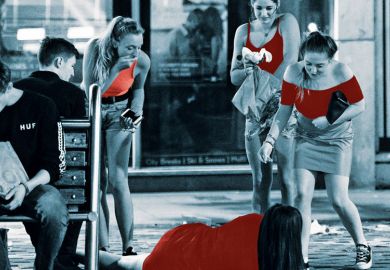A male student came to our campus security counter one morning asking for first aid. I gave him a quick visual once-over – no blood, no missing teeth – and guessed that this was more of a welfare job than a need for bandages.
The bloke asked if we could talk somewhere private. I sat him down and listened to him explain that he’d had one Diet Coke in the city centre the night before and then blacked out.
Struggling to make eye contact, the student explained that he’d come round in a stranger’s house. He had been together enough to note the address and get himself to the minor injuries unit of the local hospital, where he later tested positive for ketamine.
Our bloke didn’t seem to know what had happened to him between the Diet Coke and waking up, but the motive is often sexual – and incidents are on the rise. There has been a recorded quadrupling in spiking cases over the past five years. In London, the Metropolitan Police reported a 13 per cent increase in allegations from July to December of 2023 alone, and 26 cases were reported weekly in the Greater London area in 2023. Across the UK, there were 6,732 complaints in the year up to April 2023, and 74 per cent of victims were female.
As well as ketamine, the narcotics used in spiking include THC (cannabis) and former legal high spice – two substances my shift-mates and I sometimes find students using recreationally. And with a new academic year under way, warnings are in circulation for freshers to look out for signs of spiking: a prudent measure given that one in 10 UK undergraduates is reported as being a victim.
It’s a statistic we talk about in the guard room. It is unclear how many of the perpetrators are other students, but many campuses are also open to visitors. Student bars typically have more restrictive door policies than ones in the high street do – patrons are required to produce both proof of age and student ID, or to be signed in by a registered student and to provide their own passport or driving licence as collateral – but you sometimes get people in with nefarious intentions.
Students are seen as potentially easy targets. Many are adjusting to life in a new city, and some have very little alcohol experience. They don’t always realise that the room shouldn’t be swirling after just one drink or that the person who just bought it for them may have a hidden agenda. There’s also the pressure of being deemed a lightweight by their peers if they report feeling groggy.
Nor do they necessarily want to fill in a police report and have a potential court case disrupting the degree on which they’ve just embarked. This may partly explain why allegations of drink tampering have very low arrest and conviction rates.
One particularly uncomfortable statistic for universities is that the UK’s most prolific rapist, Reynhard Sinaga, operated while he was a PhD student in Manchester: he would offer male revellers the use of his flat while they waited for a taxi. There, he would give them a drink typically laced with class B depressant GHB. It’s estimated he assaulted up to 200 men, and is now serving a minimum of 40 years in prison thanks to the courage of his victims in coming forward.
Of course, it is down to security guards like me to do our best to ensure nothing illicit is being slipped into all those Freshers’ Week happy hour cocktails, but we’re not always hired for our approachability. Many academic staff will serve as advisers and confidants to new students, and victims may feel more comfortable disclosing a transgression to the person who reads the slides out every week, rather than to the killjoys who shut down their 4am corridor parties.
So if you’re a lecturer, keep an eye out for anxious faces in the seats in front of you. Break a few of those slides up with advice about Ask For Angela, the codeword system customers can use in licensed venues if they feel they’re in danger and need a safe space. Or you could share the student spike warning published by St John Ambulance.
You could even take a leaf out of the book of the chemistry lecturer at the University of the West of England who collaborated with one of his students to make an app that works to detect GHB in drinks.
Campus resource: Addressing sexual misconduct in higher education, part one: prevention
A training video my shift-mates and I were shown features a female customer getting her drink dosed by a man, who then poses as a concerned bystander before accompanying her home. The video then repeats and shows you all the people who saw the girl looking disorientated and could have intervened: the bar staff, the cabbie, the housemate. If you work at a university, you’re one of those faces, too.
Law lecturers will know that the Health and Safety at Work Act 1974 confers on us all a responsibility to take reasonable steps to protect each other. And security staff know that, just like when we use the DJ to make an emergency announcement during a club night, there are many ways to reach people who could be in danger.
George Bass is a security guard at a UK university.
Register to continue
Why register?
- Registration is free and only takes a moment
- Once registered, you can read 3 articles a month
- Sign up for our newsletter
Subscribe
Or subscribe for unlimited access to:
- Unlimited access to news, views, insights & reviews
- Digital editions
- Digital access to THE’s university and college rankings analysis
Already registered or a current subscriber?








